Our path towards climate neutrality
A genuine milestone in FUCHS' company history: Since 2020, FUCHS has been completely CO2-compensated at all of its more than 60 locations worldwide – from the energy consumption in production all the way up to the consumables used in administration operations. Yet we do not just focus on the ecological footprint in our own factories, but look beyond ourselves to the entire process and value chain of our products. This is why we participate in research projects on the use of sustainable raw materials. Together with our suppliers, we develop standards and measures for quantifying and certifying sustainability along the entire value chain. Above all though, our products reduce friction and increase energy efficiency for our customers – this has both a financial and ecological impact.
FUCHS' SUSTAINABILITY IN FIGURES
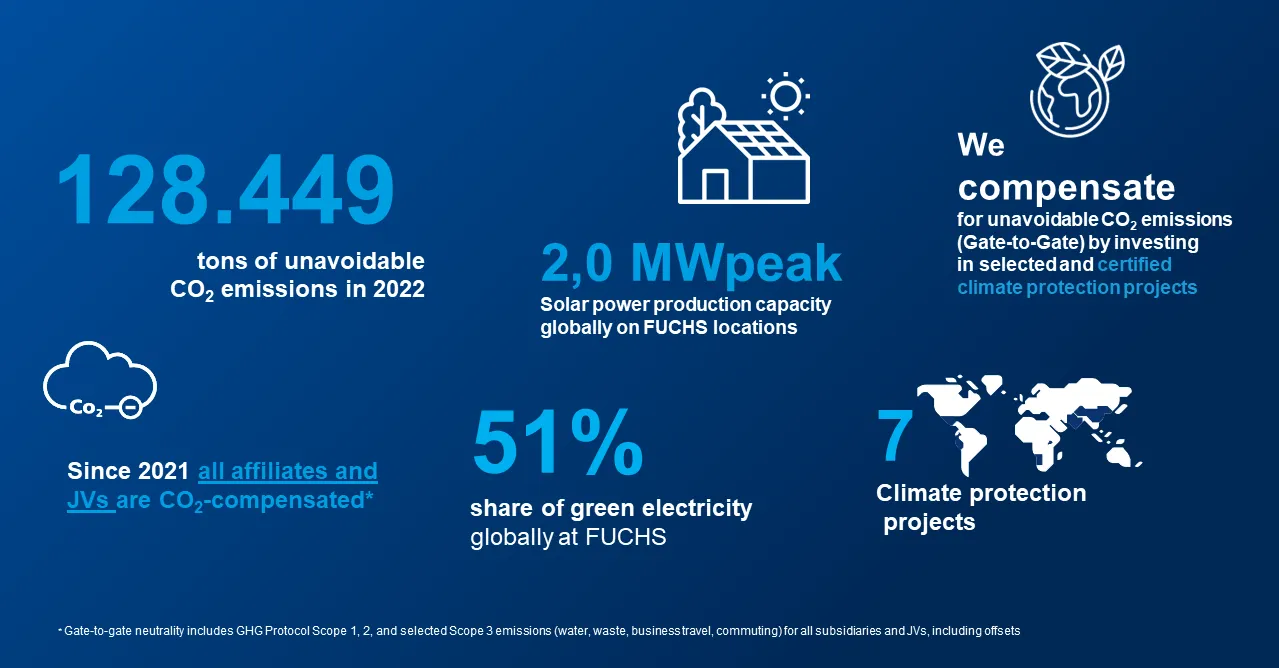
The path to 2040
ACTIVE PLAYER FOR SUSTAINABILITY
The FUCHS carbon-neutrality strategy is embedded in our sustainability strategy, which began in 2010 when we signed the "Code of Responsible Conduct for Business". In 2018 we joined the "Alliance for Development and Climate" led by the Federal Ministry for Economic Cooperation and Development. At the same time, we initiated the foundation of a sustainability workgroup under the umbrella of the Union of the European Lubricants Industry (UEIL). Together, we develop harmonized sustainability standards, KPIs, and benchmarks to enable sustainability-based comparisons.
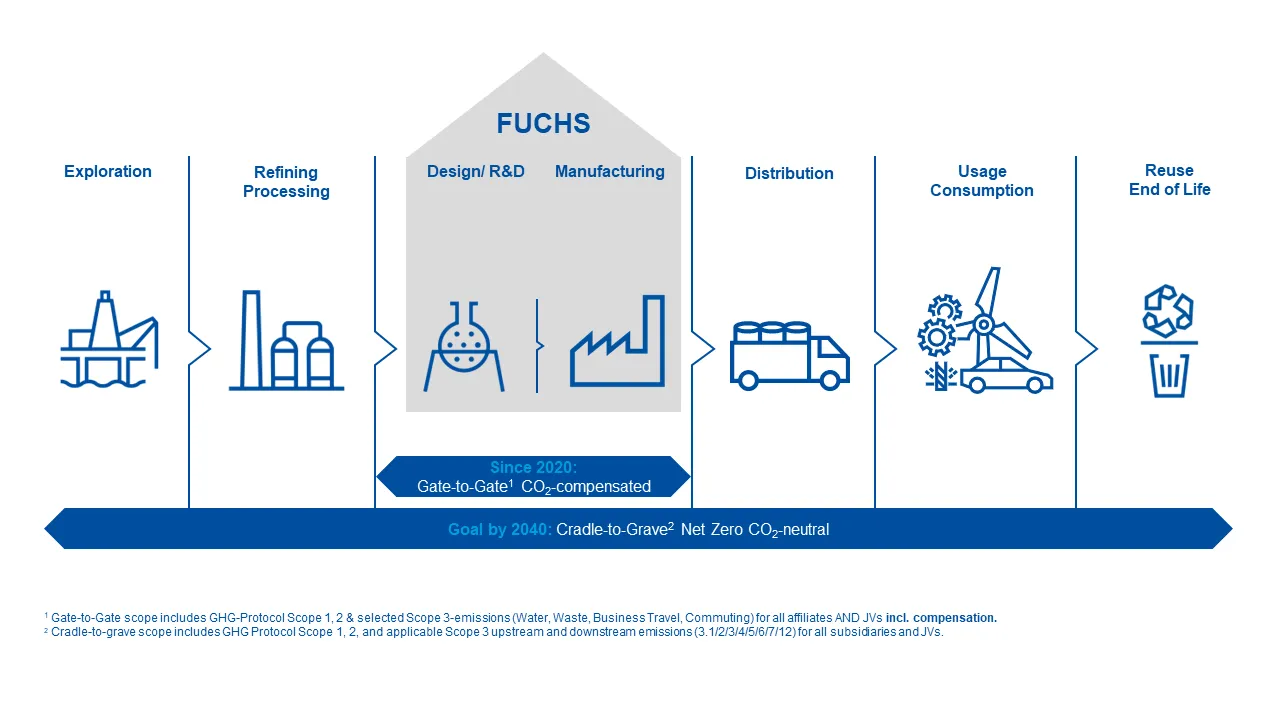
FUCHS already committed to two milestones in its neutrality strategy in 2019:
- CO2-compensated in the “gate-to-gate” scope from 2020 for all producing FUCHS companies
- CO2-compensated “cradle-to-gate“ by 2025
FUCHS has already achieved the first milestone, and in 2021 it also for the first time extended the recording of its Corporate Carbon Footprint and offset to all joint ventures. To do this, all greenhouse gas emissions of FUCHS that are directly attributable to our business activities (“gateto-gate”) have been measured retroactively since 2019 and offset through investments in climate protection projects. FUCHS restricts its choice of projects for this purpose to high-quality certifications such as UN Gold Standard or VERRA. In any case, compensation measures are only the last step undertaken once avoidance and reduction measures have met their limits. FUCHS is therefore continuously expanding the proportion of renewable energies that make up its power supply, with the aim of gradually sourcing its electricity worldwide from renewable sources.
PRODUCT CARBON FOOTPRINT
With the EU climate targets, more and more companies are focusing on their own emissions and a possible climate neutrality of business operations. The calculation of the product carbon footprint (PCF) is a major factor in this context as it summarizes all emissions along the value chain which are related to the product.
Raw materials
Buying sustainably
We know that conducting carbon-neutral operations within our own company alone is not enough. Our goal therefore is to sell carbon-neutral products long-term – and we get our suppliers on board to do this by purchasing raw materials. After all, these are responsible for 90 percent of the carbon footprint of a finished lubricant product. Within the scope of numerous research projects, we already support some of our suppliers in the search for corresponding options. And we've brought them all to the table: suppliers, competitors, and customers, in our European industry association UEIL. The objective here is to achieve measurable key performance indicators and criteria for sustainability.
Focus on biogenic raw materials
The use of biogenic raw materials from Europe as renewable, environmentally friendly alternatives to fossil raw materials is at the center of many of the research initiatives in which FUCHS is involved. Their main benefit is that they do not increase the carbon balance and their use often means a new source of income for domestic agriculture.
From deep-fat grease to a new raw material for high-performance specialty lubricants
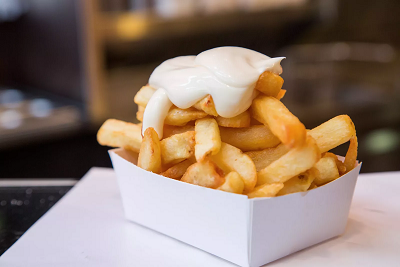
Huge amounts of waste grease are produced every day in industry and in everyday life. Especially in restaurants and snack bars, carbon-rich residual streams such as used frying fat are produced in large quantities, the potential of which has hardly been unlocked to date.
That is why FUCHS is actively taking part in research. And together with our research partners, we were able to refine frying fat to produce new, high-quality raw materials for lubricants.
Producing and using energy responsibly
Naturally, the first thing we look at in terms of sustainability at all of our sites worldwide is our own production, as this is where we can make direct changes. In this way, we have succeeded in lowering CO2 emissions per produced ton of lubricant by 30 percent since 2010. And through continuously optimizing procedures and processes, we will further reduce energy and water consumption and further increase the share of green electricity which reached 51% in 2022. In this way, we will be able to gradually roll back carbon-compensation measures through the support of climate protection projects in the medium term.
Best practices from the FUCHS world
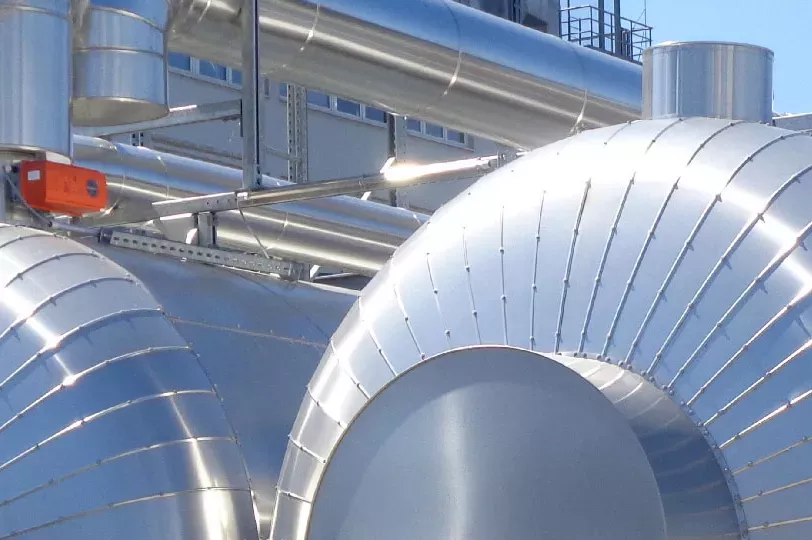
Germany: Production site heats test bay
A perfect example of ecological responsibility at the Mannheim site: High-temperature condensate from the neighboring production site is used for the newly built test field building and to keep an adjacent warehouse frost free. The high-temperature condensate supplies both the ventilation systems as well as the heaters and ceilings of the test bay building via heat exchangers. The environmentally friendly result: 18 tons of carbon dioxide are saved each year.
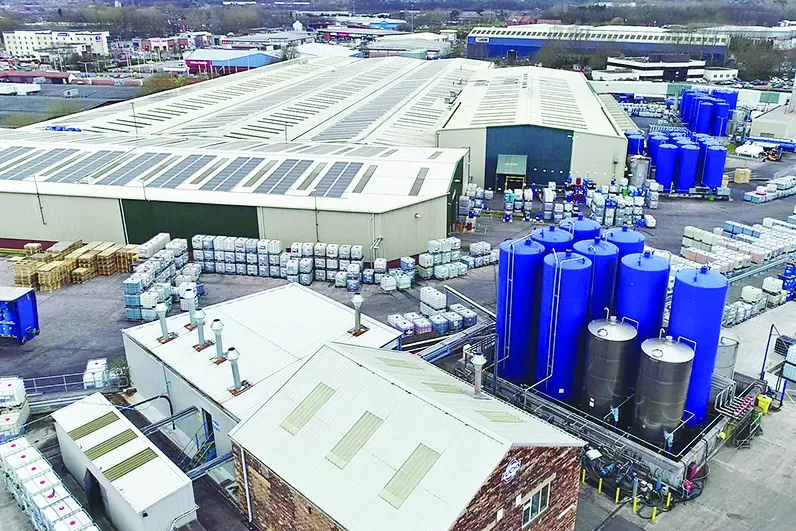
Great Britain: 2,000 solar collectors
The British FUCHS subsidiary is setting a good example. Around 2,000 solar collectors on the roof of the new office at the company headquarters in Hanley, Stoke-on-Trent, produce around 14 percent of the energy required for the entire site. 95 percent of the lighting is supplied by LED lights – and in the new, fully automated warehouse with 4,000 pallet spaces a rainwater system collecting 1.8 million liters of water per year has been installed in 2020.
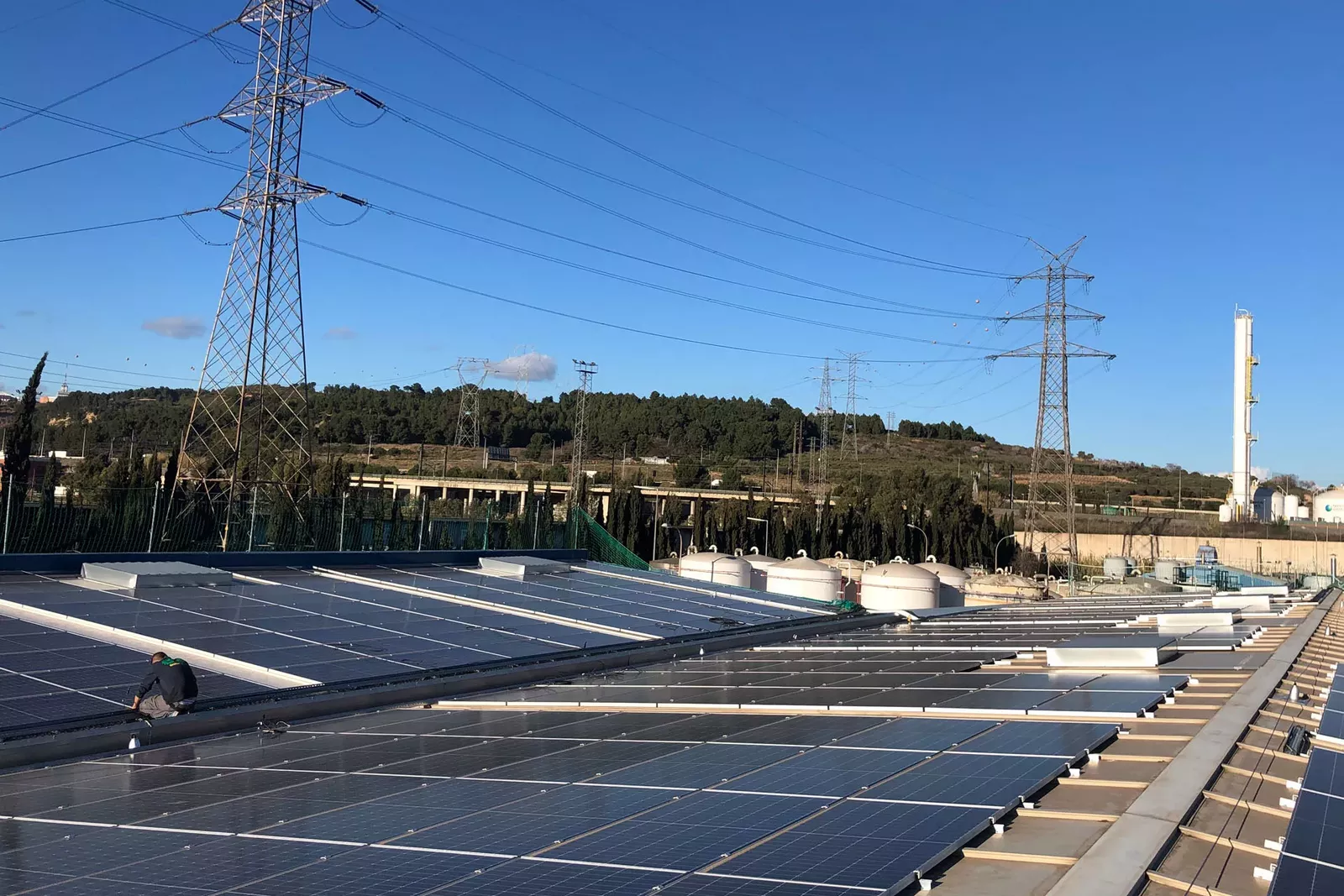
Spain: 335 kilowatt peak solar panels
Another excellent project that brings us closer to our goal of being more sustainable is at the subsidiary in Spain. FUCHS operates numerous plants and warehouses around the globe with a lot of roof space. While others invest in setting up their own wind parks, FUCHS can use the surfaces it has for building solar systems. That's exactly what is currently happening at the Spanish site in Castellbisbal. An installation covering 1,650 square meters with an installed power of 335 kilowatt peak is being built on the roofs of several warehouses.
Empowering our customers to perform more sustainably
We are convinced that enabling our customers to act more sustainably is also the key to greater efficiency and thus significant economic savings and added value potentials. This is not only the basis for the long-term economic success of our customers - but also for our own.

Sustainability organization within the global FUCHS Group
At FUCHS, responsibility for sustainability is shared by the Executive Board as a whole. The Executive Board member directly responsible is the Chief Technology Officer (CTO). The Executive Board defines the strategic framework for sustainability in close coordination with the Group’s Sustainability division headed by the Vice President for Global Sustainability (Chief Sustainability Officer, CSO).
In cooperation with FUCHS’ Sustainability Core Team, the Local Sustainability Officers (LSOs) and the Executive Board, the Sustainability Division bundles the respective requirements and derives FUCHS’ future sustainability strategy from them. This is accompanied by an ongoing dialog with the sales units, supply chain representatives, development and product management representatives and the procurement organization to map out FUCHS’ sustainability efforts throughout the supply chain. The Sustainability Core Team consists of sustainability representatives from every continent where FUCHS operates, and it meets six times per year.
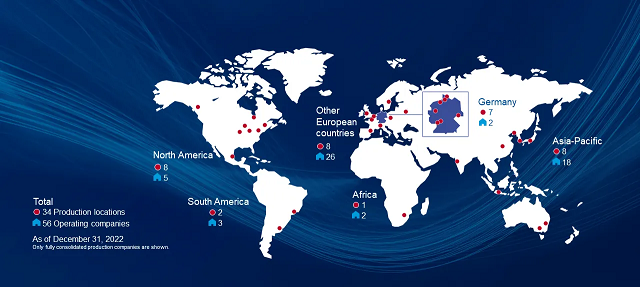
Local Sustainability Officers (LSOs) around the world
The LSOs are the connecting links between the Group company in Mannheim and every national unit. The Local Sustainability Officers are the first point of contact on site for all matters relating to sustainability. They also monitor the development of sustainability performance indicators and coordinate the local implementation of sustainability activities. This is done in coordination with the respective management teams. The LSOs report suggestions and local necessities back to the Group’s Sustainability Division or to the Chief Sustainability Officer. The LSO network meets at least every three months at the invitation of the Chief Sustainability Officer.
Fuchs Lubricants South Africa promotes environmentally responsible management of used lubricating oils and related waste in South Africa.
Fuchs Lubricants South Africa works along side the ROSE FOUNDATION very closely to achieve these strategic objectives:
- Promote the collection of at least 80% of collectable used oils.
- Create an awareness in the mind of the public that used oil is a hazardous but recyclable resource.
- Influence the behaviour of customers in their handling and disposal of used oil through effective educational and marketing campaigns.
- Develop synergistic, stable and sustainable partnerships with groups that have similar objectives. Raise awareness of ROSE’s efforts and initiatives within member companies.
- To ensure that the role of the National Oil Recycling Association of South Africa (NORA-SA) is clearly communicated and understood by all.
- Consider investments in improving the handling of various used oil containers at collector and bulking facilities to increase volumes collected. For more information please visit the Rose Foundation's Website http://www.rosefoundation.org.za/
